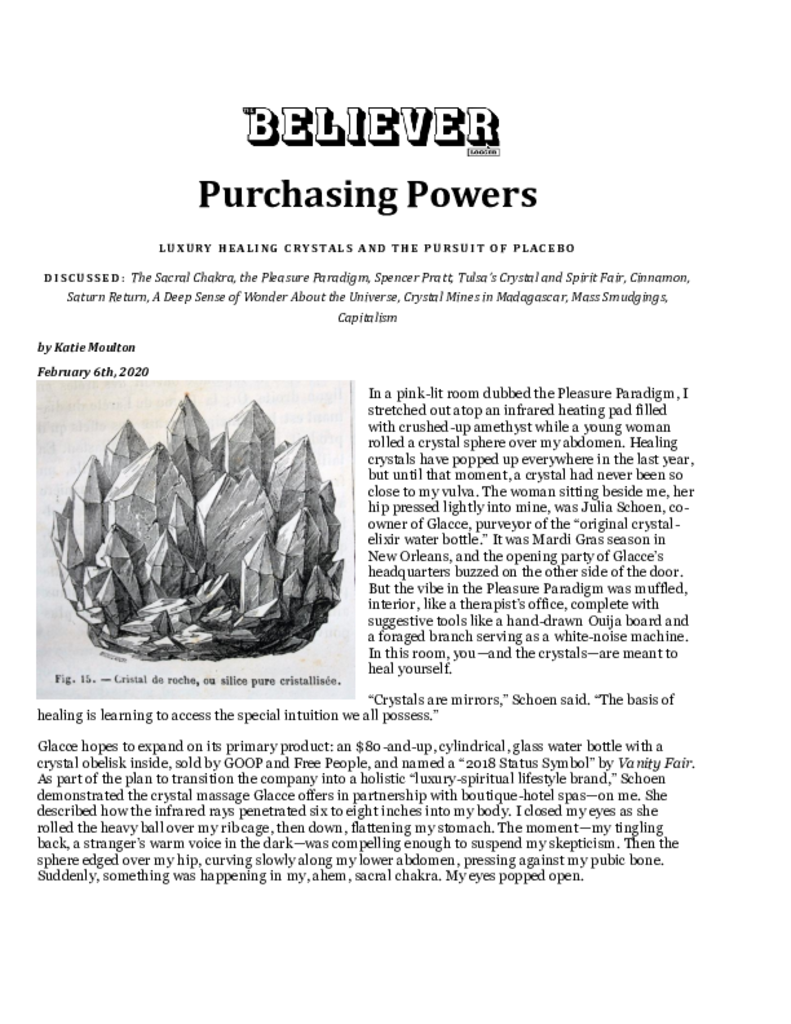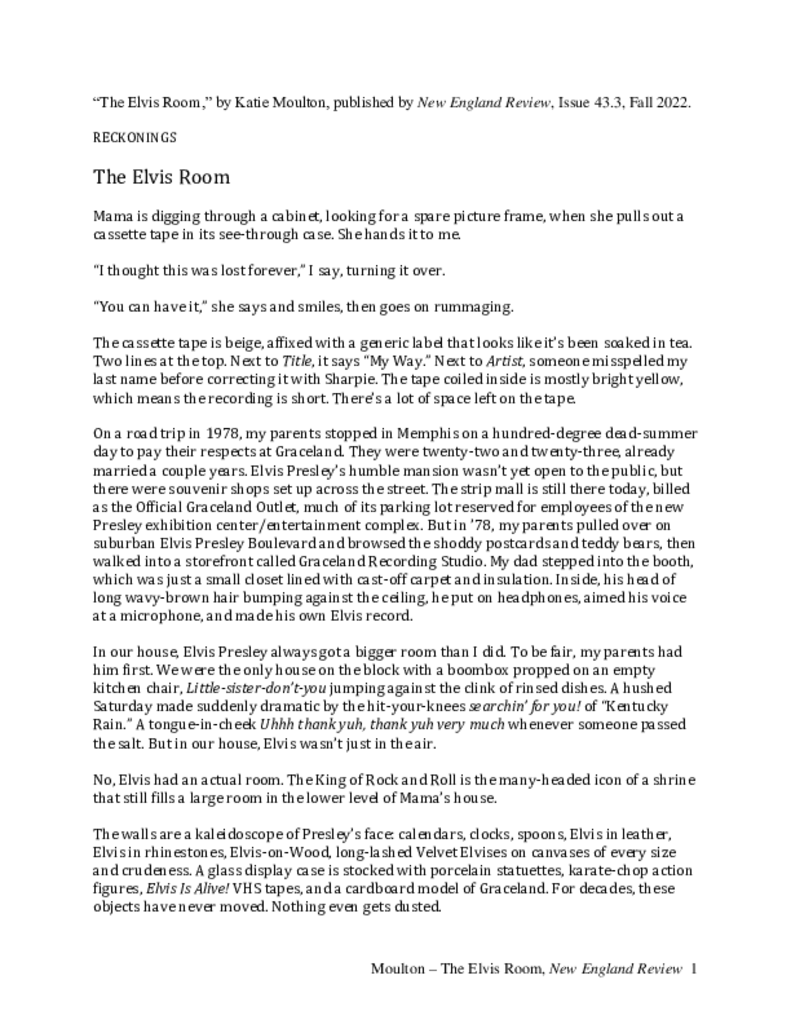Work samples
-
Dead Dad Club: On Grief & Tom Petty (Audio Memoir)
What are the limits of what the past can return to us—and can we make the record jump the loop? Audible bought the audio rights to my memoir, and published the book in 2022. From the "jacket copy": Dead Dad Club is the lucid, prismatic memoir of Katie Moulton, a millennial music critic who grew up in a die-hard rock-and-roll family, about her father’s unexpected death from addiction shortly before her 17th birthday, and the music obsession she inherited from him that shaped her early adulthood.
Available for Purchasehttps://www.audible.com/pd/Dead-Dad-Club-Audiobook/B0B2FRZ9TX?asin=B0B2FRZ9TX&source_code=AUDOR2220613229W0V
-
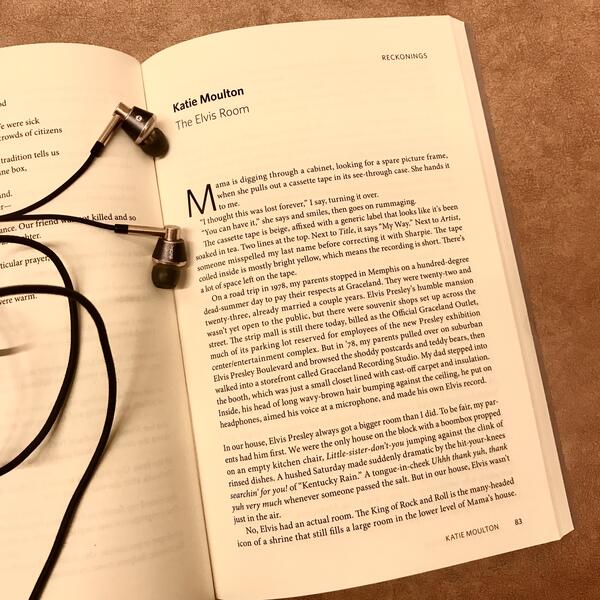 Personal Essays
Personal EssaysAs an essayist, I combine personal narrative and exploration of music and culture. These essays, interrogating the nature of memory, and how grief and nostalgia remake reality and space, have been widely published in literary journals and culture magazines like New England Review, Sewanee Review, Ninth Letter, Oxford American, The Rumpus, Tin House, and elsewhere. They have been anthologized in books from W.W. Norton and Columbia University Press, and recognized as Notable in Best American Essays and received Special Mention in the Pushcart Prize Anthology.
-
Cultural Criticism & Journalism
An important part of my work is reported cultural journalism, often centered on our unlikely searches for meaning through pop music, material objects, and offbeat affinity groups. I have explored ecomusicology, secondhand Elvis memorabilia markets, pilgrimages to artists' graves. I have interviewed artists and experts across disciplines -- painters, filmmakers, dancers, novelists, conservators, and people from every facet of the music industry -- for articles that examine how individual craft intersects with the zeitgeist. This piece, "Purchasing Powers: Luxury Healing Crystals and the Pursuit of Placebo," was published by The Believer in 2020 and featured at an artist talk in Mexico City. What began as an examination of a particular product within the booming "wellness" industry took me crystal-digging in western salt flats, on a reporting trip to New Orleans, and sitting with a medium in a Tulsa hotel ballroom. This piece is included in my essay collection in progress.
-
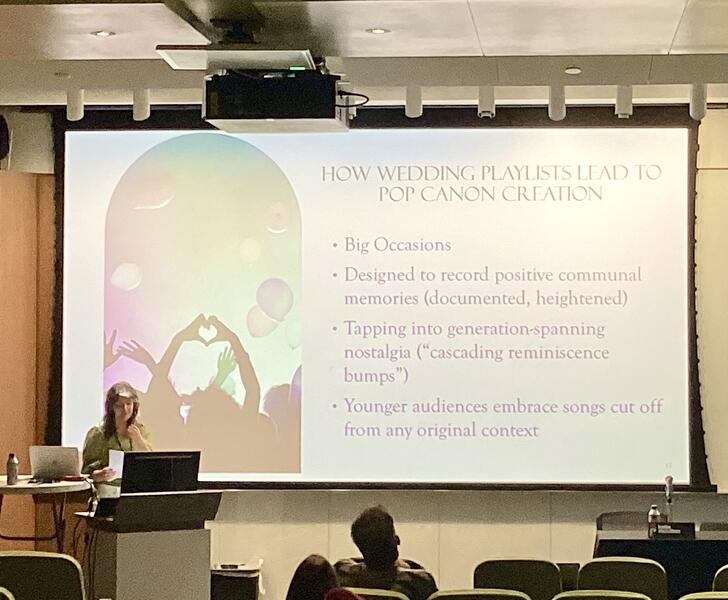 Literary Community and Public Scholarship
Literary Community and Public ScholarshipPart of my practice is to contribute to public discourse as a pop-music critic and scholar. I share work and moderate panels with professional conferences and organizations like Pop Conference, the World of Bob Dylan Conference, AWP; appear as a podcast guest; and publish essays and articles in print and digital with outlets like Salon, Consequence, No Depression and elsewhere.
Pictured above is"Generation Brightside: How Wedding Reception Playlists Predict Future Nostalgia" is a selected presentation I delivered at the 2023 Pop Conference, the premiere annual music writing and pop music studies conference.
The talk uses The Killers' unexpectedly enduring hit, "Mr. Brightside," to explore how songs/artists that dominate multi-generational venues like wedding receptions, where the "mainstream" is adapted to the personal, determine what music gets preserved and passed on.
About Katie

KATIE MOULTON is a writer, editor and music critic living in Baltimore City. Her audio memoir, Dead Dad Club: On Grief and Tom Petty, was published by Audible in 2022.
Her essays, stories, and articles have appeared in The Believer, New England Review,… more
Dead Dad Club: On Grief & Tom Petty - Audio Memoir
What are the limits of what the past can return to us—and can we make the record jump the loop?
Here is what the publisher says about the book: Dead Dad Club is the lucid, prismatic memoir of Katie Moulton, a millennial music critic who grew up in a die-hard rock-and-roll family, about her father’s unexpected death from addiction shortly before her 17th birthday, and the music obsession she inherited from him that shaped her early adulthood. A quintessentially American tale about family, grief, identity, and dependency, set in the Midwest and scored in the writer’s imagination by the timeless Tom Petty and the Heartbreakers.
Dead Dad Club follows Katie as she navigates her grief and moves to Bloomington, Indiana–the town where her parents began their love story–to write and work as a radio DJ, spinning records that defined her father, a former record-store manager, and her relationship to him. In struggling to carve out her own space, she grapples with the inevitable questions of one’s 20s: How should we relate to our families as we become our own people? Are we fated to become our parents, or can we change the narrative?
Scored with entirely original music by Pinegrove’s Evan Stephens Hall, Dead Dad Club collapses the space between joy and sorrow, and what emerges is a personal yet universal story that spans genres and eras, richly told with tenderness, humor, and the knowledge of how nostalgia colors our lives—even as we endeavor to push forward past our grief.
-
Trailer 1 for DDC
Behind the scenes trailer for the making of Dead Dad Club, featuring Katie Moulton (me - writer, narrator) and composer Evan Stephens Hall. Created/directed by Dylan Owens.
-
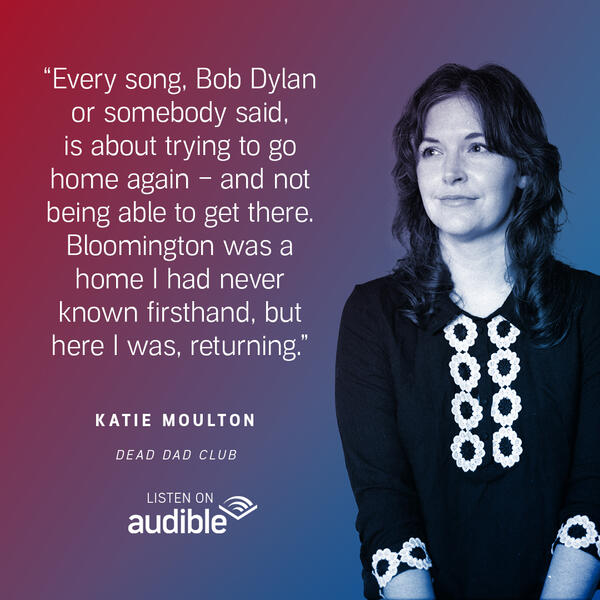 Dead Dad Club graphic
Dead Dad Club graphic -
Dead Dad Club - Behind the Scenes Trailer 2
-
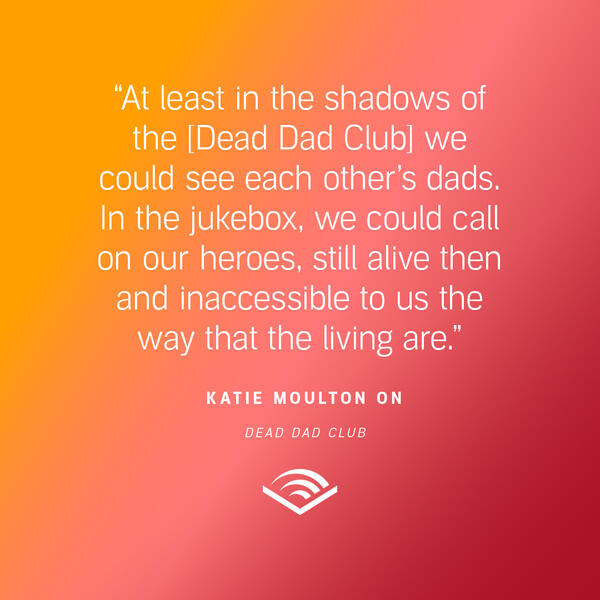 DDC graphic
DDC graphic -
Podcast feature on DDC with Tom Petty Project
-
 In the studio recording the narration of Dead Dad Club
In the studio recording the narration of Dead Dad Club -
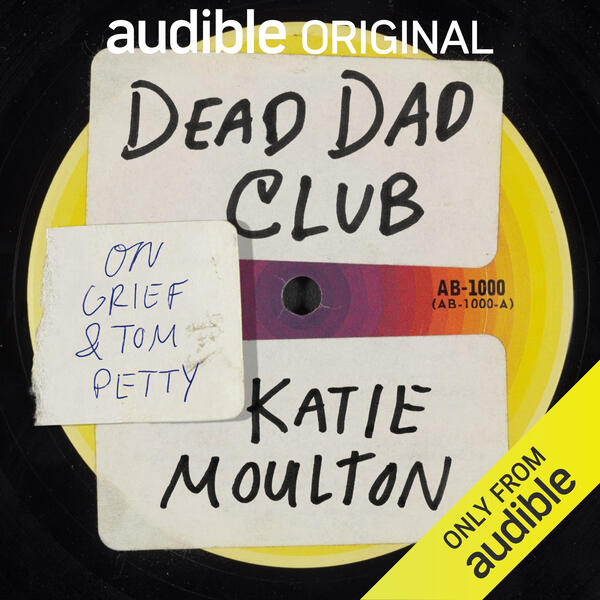 Dead Dad Club: On Grief & Tom Petty
Dead Dad Club: On Grief & Tom PettyDead Dad Club: On Grief & Tom Petty is my audio memoir, published by Audible in June 2022. The book seeks to collapse the distance between personal narrative of coming-of-age through grief and close examination of defining popular music. What are the limits of what the past can return to us--and can we make the record jump the loop?
Available for PurchaseAvailable for streaming and download at Audible.
-
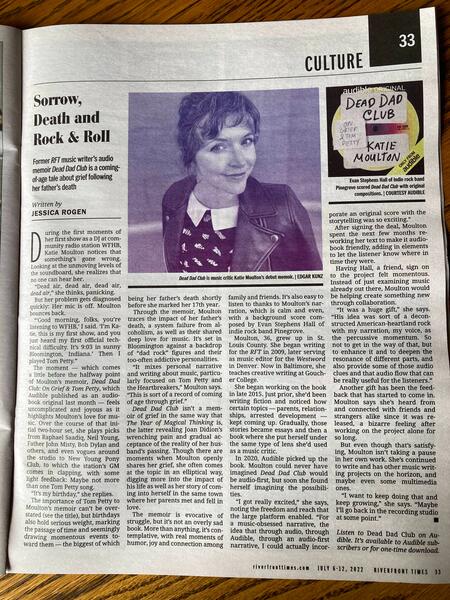 Press feature on DDC
Press feature on DDC -
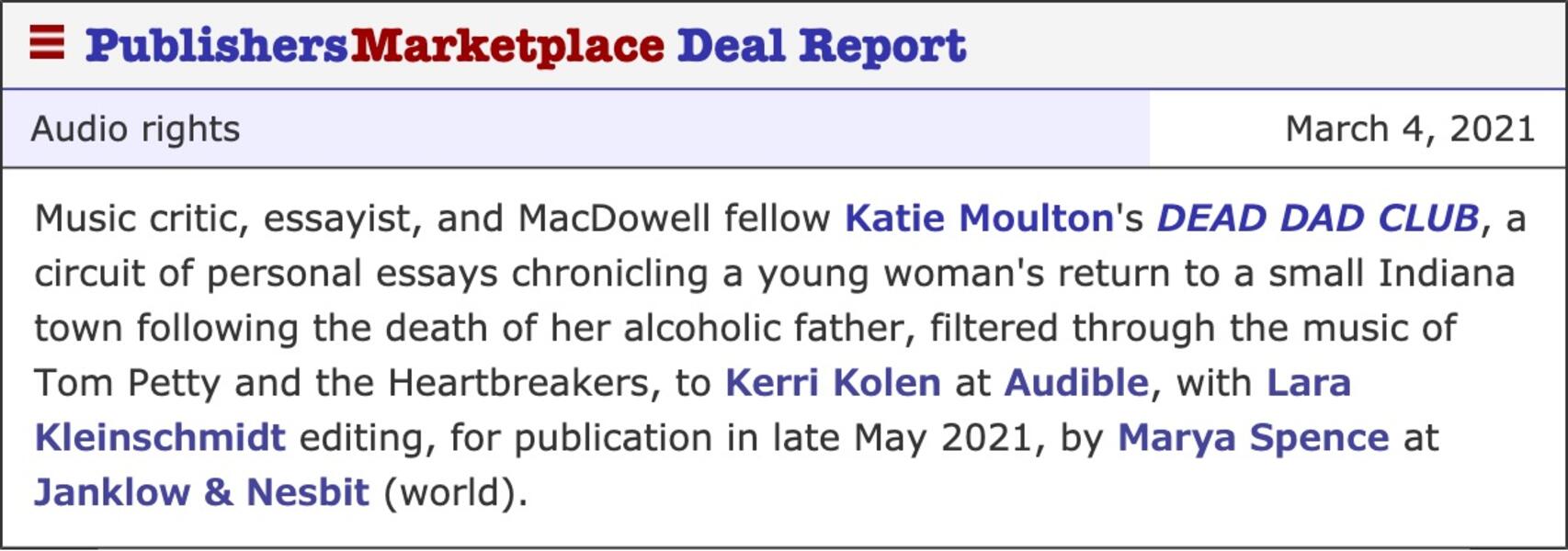 DDC Publishers Marketplace announcement
DDC Publishers Marketplace announcement -
Opening of Dead Dad Club, audio recording
This is the opening interlude of Dead Dad Club (Audible Original 2022). I perform the narration over a score composed by Evan Stephens Hall.
Essay Collection: "Could It Be Anybody"
The essay collection in progress, from the POV of a Midwestern Millennial pop critic, explores the effects on a generation that grows up expecting reality to be rendered obsolete. These essays combine personal narrative and cultural criticism, focusing on the nexuses of pop and technology, from first-generation iPods to the post-algorithm end of monoculture. Ranging from Hanson to luxury healing crystals, from Nelly to Gilmore Girls, from emo to Facebook memorials, the collection digs into fandom, nostalgia, interpretation vs. appropriation, and material culture – specifically the delusion, revelation and healing possible through cultural ephemera. In the vein of Elena Passarello and Claire Dederer, this collection of form-bending essays considers our moment's attempts at meaning through mediation. These essays have been published or are forthcoming in magazines like New England Review, Sewanee Review, The Believer, The Rumpus, No Tokens, Catapult, Ninth Letter, and IMAGE, and recognized in Best American Essays and the Pushcart Prize Anthology.
-
"Could It Be Anybody," recording of personal essay, 2023
This essay examines Joe Cocker's cover of the Beatles' "With a Little Help from My Friends," which weaves discussions of authorship vs. interpretation vs. appropriation. It was commissioned by the annual March Xness music-essay tournament, and was voted to the final four of the competition.
"We started this thing with the original 'With a Little Help from My Friends' because that song is the secret knowledge that Cocker’s cover spins around. Because covers are about convoluted and overlapping lineage, about how songs are passed throat to throat.
The ideal cover does not improve, does not dominate, and does not supplant the original. It may sound like an oxymoron, but the function and success of a cover song is how it uncovers. How it reveals the hidden capacity of a song in a manner that the writer or first performer could neither deliver nor predict."
-
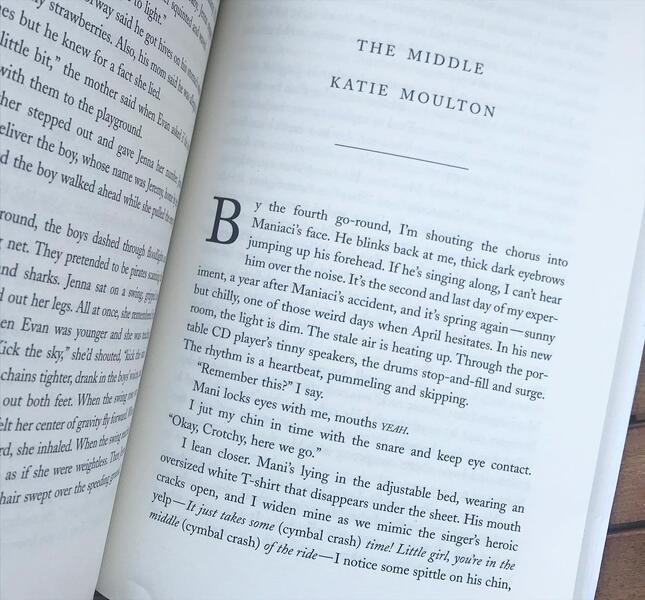 "The Middle," personal essay, 2022
"The Middle," personal essay, 2022"The Middle," published by Sewanee Review. Received Special Mention in 2022 Pushcart Prize Anthology. The essay recounts the story of my good friend who suffered severe brain trauma, and explores early-00s emo, Millennial nostalgia, and how memory forms identity.
-
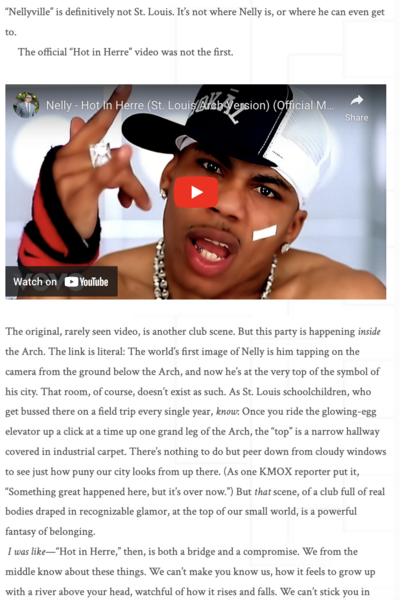 How Nelly's "Hot in Herre" Defined Millennial Pop, 2023
How Nelly's "Hot in Herre" Defined Millennial Pop, 2023"The Middle of Everywherre: How Nelly's 'Hot in Herre' Defined Millennial Dance Pop," personal essay first commissioned and published for the March Xness annual music essay competition.
Excerpt: "The bridge, in true country songwriting fashion, punctures the dream, as Nelly keens, “I just want to go and look/Won’t you please take me on in.” “Nellyville” is definitively not St. Louis. It’s not where Nelly is, or where he can even get to.
The official “Hot in Herre” video was not the first. The original, rarely seen video is another club scene. But this party is happening inside the Arch. The link is literal: The world’s first image of Nelly is him tapping on the camera from the ground below the Arch, and now he’s at the very top of the symbol of his city. That room, of course, doesn’t exist as such. As St. Louis schoolchildren, who get bussed there on a field trip every single year, know: Once you ride the glowing-egg elevator up a click at a time up one grand leg of the Arch, the “top” is a narrow hallway covered in industrial carpet. There’s nothing to do but peer down from cloudy windows to see just how puny our city looks from up there. (As one KMOX reporter put it, “Something great happened here, but it’s over now.”) But that scene, of a club full of real bodies draped in recognizable glamor, at the top of our small world, is a powerful fantasy of belonging.
I was like— “Hot in Herre,” then, is both a bridge and a compromise. We from the middle know about these things. We can’t make you know us, how it feels to grow up with a river above your head, watchful of how it rises and falls. We can’t stick you in the wild heat of the downtown fair on the Landing, sweat stains on the concrete, fire rocketing from the barges in the dark."
-
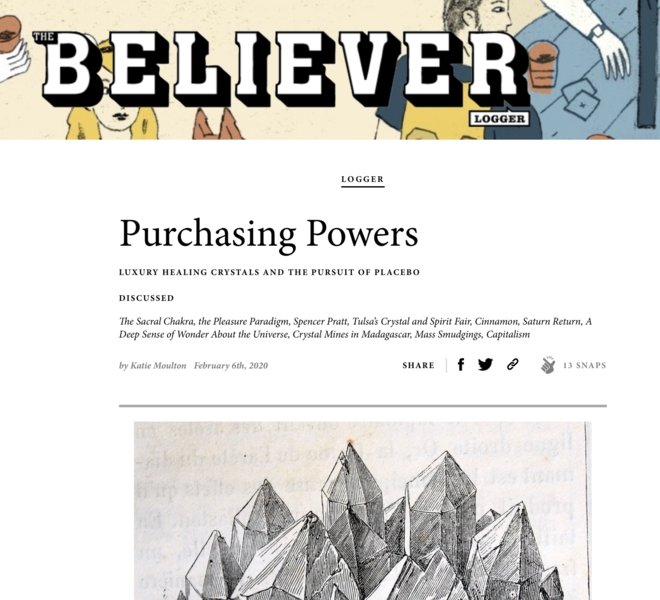 "Purchasing Powers," The Believer, 2020
"Purchasing Powers," The Believer, 2020First-person reported feature on luxury healing crystals industry for The Believer, published in February 2020.
-
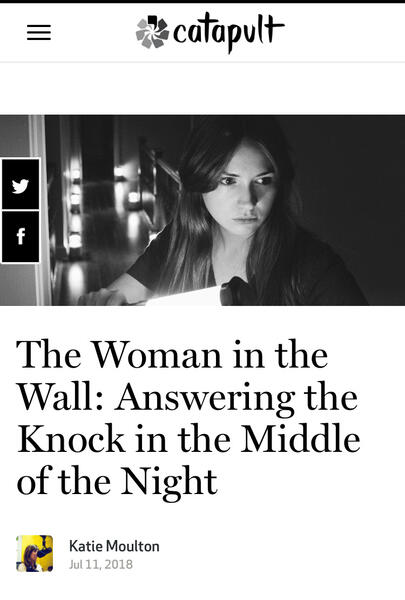 "The Woman in the Wall," personal essay, 2018
"The Woman in the Wall," personal essay, 2018"The Woman in the Wall" is a personal essay published by Catapult in 2018.
"I don’t fetishize the vulnerable body. I’ve spent my life denying its existence—to friends, boyfriends, strangers on the street. To every shadow that quickens my step, every creak in an old house that sets my stupid heart spinning.
We must constantly negotiate the knowledge of our vulnerability—both real and amplified by the stories we’re told. We tamp it down while gripping it tight, keys clutched like blades between knuckles. How many risks have I taken, how many brain cells have I obliterated in order to assert my ability to move through the world on my own terms?"
-
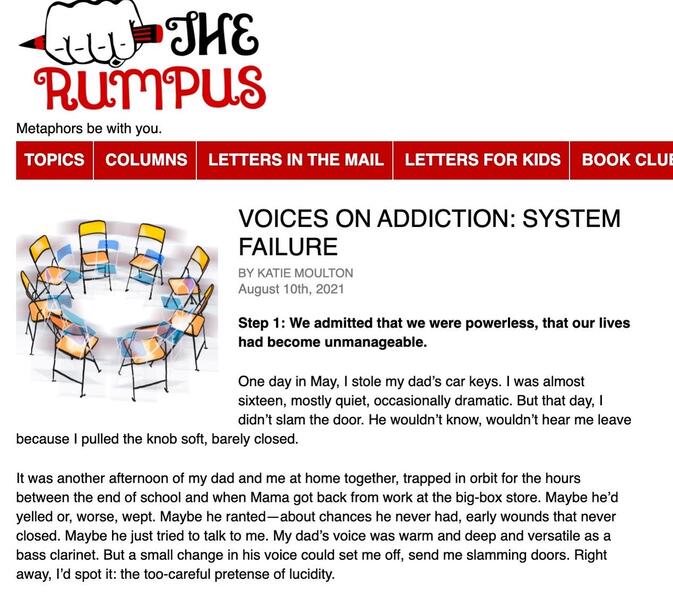 "System Failure," personal essay, 2021
"System Failure," personal essay, 2021"System Failure," short memoir, was published by The Rumpus in 2021. This piece adapts and distorts various systems -- 12-step recovery programs, maps, storytelling -- to recount the experience of coming of age while losing my father to death from addiction.
-
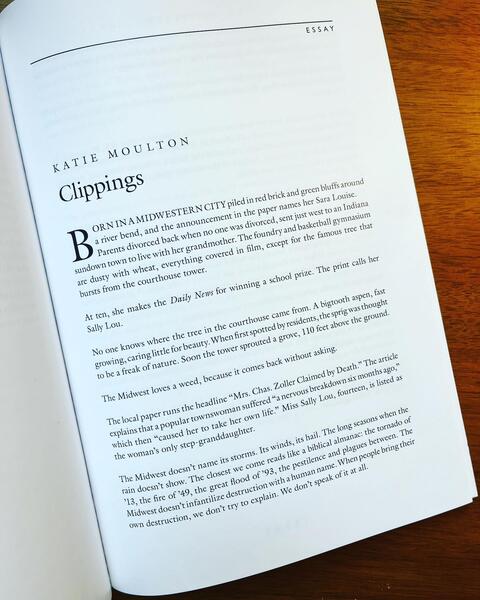 "Clippings," personal essay, 2023
"Clippings," personal essay, 2023"Clippings," personal essay, was published by IMAGE Journal in 2023. The essay uses newspaper clippings that mention my grandmother's name over the course of her 100-year life as an attempt to gather a portrait of a beloved and yet unknowable relative.
-
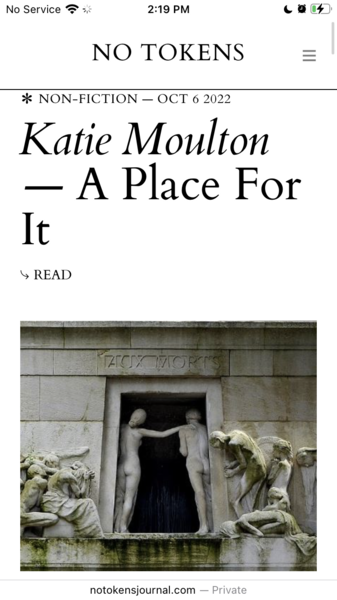 "A Place for It," personal essay, 2022
"A Place for It," personal essay, 2022"A Place for It," personal essay, was published by No Tokens in 2022. This short memoir recounts guiding my mother around Paris when I was 17, one year after my father died, and visiting Jim Morrison's grave. Hijinks ensue. It explores different definitions of nourishment and rituals for grieving.
-
"The Elvis Room," personal essay, 2022
"The Elvis Room" is a personal essay, published and featured in New England Review in fall 2022. It was listed as "Notable" in Best American Essays 2023 and anthologized in A Flame Called Indiana: An Anthology of Contemporary Hoosier Writing. It is included in my essay collection in progress.
-
"Little Ditty," personal essay, 2024
"Little Ditty," personal essay, was published by Ninth Letter in 2024. This essay uses fictional techniques to recreate the lives of the speaker's parents before she knew them, and to recount the complicated history of John Mellencamp's "Jack & Diane," developing narrative threads until they converge in an exploration of how "origin stories" function.
